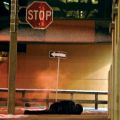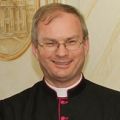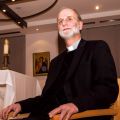Toronto - On the journey from a hospital bed back home, a patient may be visited by licensed doctors, licensed nurses, licensed psychologists, licensed pharmacists, licensed physiotherapists and a chaplain.
This is scheduled to change some time in 2014, when chaplains in Ontario hospitals, jails and other institutions will be licensed and held accountable to a professional college — just like doctors, pharmacists and nurses.
“People who work in spiritual care are really touching very deep, vulnerable places in people,” said Christine O’Brien, spiritual care trainee at Bridgepoint Health in Toronto. “There should be some regulation about training. It shouldn’t be simply that I have a nice background and I’m a nice person. There’s too much involved in what actually happens in patient care.”
The provincial government isn’t trying to regulate religion or oversee prayer, said Joyce Rowlands, the registrar of the Transitional Council of the College of Registered Psychotherapists and Registered Mental Health Therapists of Ontario.
“There are people in the province who are pastoral counsellors or spiritual care therapists, as some call themselves, who actively have wanted to be part of this process and become members of the new college,” Rowlands told The Catholic Register.
Chaplains, particularly those employed by hospitals, will want to be part of the college because hospitals will begin to make membership the minimum standard for working in their spiritual care departments. A 1991 law specifically rules out prayer and ritual as a form of therapy that the government needs to regulate. But anyone who enters into a specifically therapeutic relationship with people who suffer serious emotional, cognitive or psychological issues will need to be part of the new college when it’s up and running.
Chaplains employed by the Church to provide sacramental ministry, anything from delivering communion to hearing confessions, will be exempt.
O’Brien is taking a 12-week, intensive Clinical Pastoral Education (CPE) program at Bridgepoint, a major rehabilitation hospital in Toronto. O’Brien already has a Master of Divinity degree from Toronto’s University of St. Michael’s College and will need four such units of CPE training plus a course on the legal responsibilities and limits of caregivers before she qualifies to be licensed by the new college. While the college can’t dictate who the hospitals hire, nobody in the field believes hospitals will hire chaplains who aren’t members of the college.
In the early going, working under a supervisor, O’Brien sees how her work fits into a team of professionals working toward healing for patients.
“We’re talking about talking with patients who are in a vulnerable state, because they are ill, about issues of meaning and purpose in their lives,” she said. “About perhaps whether they believe in an afterlife. Are they feeling judgment? Are they terribly frightened because they think of their mortality? Their doctor doesn’t want to talk about their mortality and all those issues. These are spiritual issues.”
Catholic clergy and volunteers who visit Bridgepoint are also part of the bigger, healing picture. Even though O’Brien is Catholic she can’t do her job and deliver communion to all the Catholic patients. Neither can she say Mass or hear confessions. But she can help people to see their lives in a broader spiritual context — an insight that will make Mass and sacraments less isolated events and more part of the fabric of life as patients heal.
But making chaplains into therapists might not be such a good idea, says Jesuit Father Desmond Buhager, Regis College lecturer in family therapy and pastoral counselling.
“It could be conceived of as a medicalization of the role of chaplain,” he said. “They’re part of a health care team, but we don’t start calling social workers occupational therapists. They simply aren’t. So why try to glom them (chaplains) together with psychotherapists? They’re not mental health workers... They’re chaplains.”
How people are held accountable matters, said Buhage. Spiritual care staffers, especially at hospitals, will find themselves part of a College of Psychotherapy and Registered Mental Health Therapist. The problem is they’re not psychotherapists, Buhager said.
“The idea of levelling everything to making chaplains all of a sudden psychotherapists or requiring them to be mental health therapists is inappropriate,” said Buhager, himself a registered psychotherapist in the United States. “It’s weird. Excuse me. We (psychotherapists) did five or six or seven years of training as therapists with specific course curriculum and clinical hours of supervision simply to be treated the same as people who have done a few CPE units? Doesn’t sound right.”
The act which mandates the college was passed at Queen’s Park in 2007. It is one of five new health care colleges being created in Ontario. But the 2007 act can’t be proclaimed into law until regulations are in place. Trying to figure out how to regulate psychotherapy has been a huge challenge and the transitional council long ago abandoned hopes it would make an April 2013 deadline for establishing the new college.
“We spent two years trying to figure out, who are we regulating? What is the difference between these two titles (psychotherapist and registered mental health therapist)? What kinds of training and education does this very diverse spectrum of practitioners have? What should the requirements of registration be?” said Rowlands.
Psychotherapists will be required to complete 360 hours of supervised clinical training in a program that requires an undergraduate degree. RMHTs will more typically have community college training and 180 hours of supervised clinical work.
For spiritual care the usual standard is four units of CPE leading to specialist certification plus a Master of Divinity, Master of Theological Studies or equivalent degree.
Some psychotherapists have pushed for more stringent requirements — namely a masters degree in psychotherapy or a related counselling discipline, plus time spent in supervised clinical work. The problem with that is there’s only one masters psychotherapy degree in all of Ontario — Wilfrid Laurier University’s MA in theology with a specialization in spiritual care and psychotherapy. It also leaves out Jungian, Gestalt and other kinds of therapists who train in independent institutes that don’t award a masters degree.
However the work is labelled and licensed, O’Brien is convinced it’s necessary work.
“It’s a grace. It’s a satisfaction. Grace is in knowing that somehow I’ve been able to journey along even in a small way with this person who is in great need,” she said.
Federal government seeks private partnerships for social services
By Deborah Gyapong, Canadian Catholic NewsOTTAWA - The federal government is soliciting ideas from the business and charitable sector on how to best solve intractable social problems such as homelessness, hunger and drug abuse.
“Here’s the straight talk: we can’t fund every single, solitary service that people want, without regard for the taxpayers’ ability pay for it,” Human Resources and Skills Development Minister Diane Finley told a group of business and NGO leaders in Toronto Nov. 8.
“It’s time for us to unleash individual initiative so that those who are motivated can help others and those who need help are given the opportunity to take more responsibility to help themselves,” she told the fifth annual Social Finance Forum sponsored by MaRS, a pioneer organization bringing business and NGO leaders together to find innovative ways of tackling social issues.
Finley asked for ideas on how to leverage business and NGO expertise with government funding that would reward measurable results in achieving goals. The government also proposes rewarding “social finance” from the private sector in the form of Social Impact Bonds. These are contracts where the government agrees to pay a charity or NGO an amount of money if agreed upon results are achieved.
“Payment from the government is tied to program outcomes,” Finley said. “If — and only if — the agreed upon outcomes are achieved, the government pays the investors the agreed premium, as well as the original investment.”
Finley announced the launch of a web site to receive innovative ideas for tackling social needs at www.actionplan.gc.ca.
“This is an interesting model,” said Citizens for Public Justice (CPJ) executive director Joe Gunn.
“Will it add anything to what we’re all doing to work against poverty?”
The projects likely to be taken on by the private sector would tend towards those which have more of a possibility of success, leaving behind more difficult projects where, over the short term, it is more difficult to see progress, he said.
Gunn challenged the view government programs do not work in addressing poverty. The CPJ’s Poverty Trends Scorecard — Canada 2012 released in October showed government intervention makes a difference, particularly in rates of seniors living in poverty. A generation ago 30 per cent of seniors lived in poverty, but after government programs targeted this issue, only five per cent of today’s seniors are poor, he noted. Single women with children are also faring better, he said.
It is good that the government recognizes the need charitable organizations and NGOs have for government support in accomplishing their missions, Gunn said, and he would like churches to push for higher levels of taxation to cover the cost.
“Taxes are what we pay for a civilized society and how we care for each other,” Gunn said, noting higher taxes could pay for better home care, pharmacare and other programs to bring about more equity. “I don’t think the private sector or charitable sector can get us there.”
Dave Quist, executive director of the Institute of Marriage and Family Canada (IMFC), said Finley’s approach recognizes that charitable organizations can do a better job as they are more specialized in helping the downtrodden. But he warned rates of charity are declining as are rates of volunteerism. Families are under stress trying to pay the mortgage and buy groceries, he said, and parents often don’t have much free time.
Christians differ in how best to address social problems, he said, indicating some concern that big government programs and high levels of taxation have contributed to the decline in private charitable giving and volunteering.
There is a “social gospel” view that looks to generously financed social programs that has prevailed in Canada, he said. Other Christians, such as those who are centreright, support a more capitalist or free-enterprise approach that sees the best solution to poverty in supporting conditions that help people get a good paying job, he said. “We look at the same problem but through different lenses,” said Quist. “The best poverty program is a good job and we see that in family life. When mom and dad have a stable income that family is much more stable; their marriage is much more stable. That doesn’t mean giving them money, but allowing them the dignity of meeting their own needs.”
Many Western countries have realized their generous social programs are not sustainable, he said.
New bishop named for Timmins diocese
By Catholic Register StaffMsgr. Serge Poitras, P.H., has been named the new bishop of Timmins in Northern Ontario.
Pope Benedict XVI made the announcement Nov. 10. At the time of his appointment, Bishop-elect Poitras was Adjunct Under Secretary of the Congregation for Bishops at the Holy See. He succeeds Bishop Paul Marchand, who died in office in 2011. Since then, Fr. Patrick Lafleur has been diocesan administrator.
Poitras was born on May 27, 1949, in Jonquière, Que. After studies in Chicoutimi and Quebec City, he was ordained to the priesthood on May 27, 1973, for the diocese of Chicoutimi. He holds a Master’s degree in theology from Laval University and a doctorate in theology from the Pontifical Gregorian University, Rome.
During his ministry as a priest, Poitras served the Cathedral parish of Chicoutimi as assistant pastor, the Chicoutimi minor seminary as a professor, and the diocesan centre where he was responsible for pastoral ministry with students. From 1990 to 2000, he taught at the Grand Séminaire of Montreal, where he was a member of the formation team, as well as director of studies from 1998 to 2000. During this time, he also provided pastoral assistance in a number of Montreal parishes.
In 2000, he was appointed French-language secretary at the apostolic nunciature to Canada. The Holy Father subsequently named him Adjunct Under Secretary of the Congregation for Bishops on Dec. 29, 2010.
The Timmins diocese has 26 parishes and missions, with a Catholic population of 50,605, which is served by 18 diocesan priests, four priests who are members of religious communities, 17 religious Sisters and Brothers, six permanent deacons and five lay pastoral assistants.
Veterans help students understand why we remember
By Evan Boudreau, The Catholic RegisterTORONTO - Gerry O'Pray served his country in the armed forces for eight years and now he wants young people to understand why.
"We have to stand up for our values that citizens have fought and died for," said O'Pray. "Remembrance is good but maintaining and living our values is the best way to honour those who've served."
O'Pray was speaking to 55 Grade 8 students from St. Gabriel Catholic School on Nov. 6s. The students placed paper poppies inscribed with personalized messages at a memorial set up at the Catholic Education Centre.
"Thank you for fighting for our peace and our lives," said one note.
"May your neighbours respect you, trouble neglect you, angels protect you and heaven accept you," said another.
"Because of our soldiers I may stand tall and free, not having to worry about a gun and having to flee," said a third.
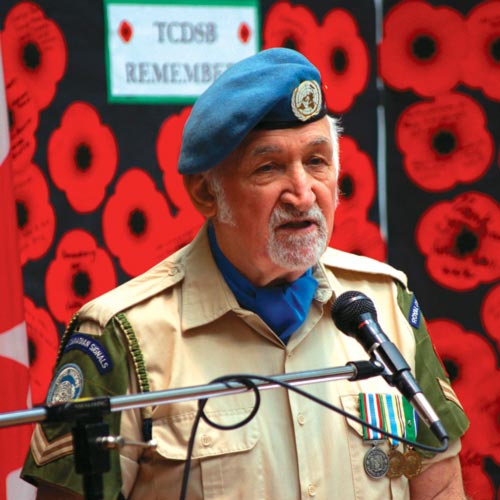
Gerry O'Pray speaks to 55 Grade 8 students about why he served.
- Photo by Evan Boudreau
O'Pray, who turns 71 this Remembrance Day, joined the Canadian Forces in 1959 at 18 after graduating high school in Truro, Nova Scotia. Two years later he was in the Congo serving in a peacekeeping role with the United Nations — a mission that saw 256 peacekeeping soldier casualties, including two Canadians.
"When I was on the Congo mission, there were 37 countries as part of that mission," he said. "It was then that I realized how much I appreciated my country. The Congo mission ended in 1964 (and) unfortunately we left a really brutal dictator in charge."
Following that two-year tour, O'Pray returned home until deploying to Egypt for a year. He ended his eight years of service safely in Canada and transitioned back into civilian life. But he's never forgotten why he served.
Remembrance Day fell on a Sunday this year, outside of school hours, but the Toronto Catholic District School Board (TCDSB) was intent on remembering the men and women who've served the nation. That long list includes one of the board's own, Second Lieutenant Christian Cieplik, a graduate of the Toronto Catholic school system.
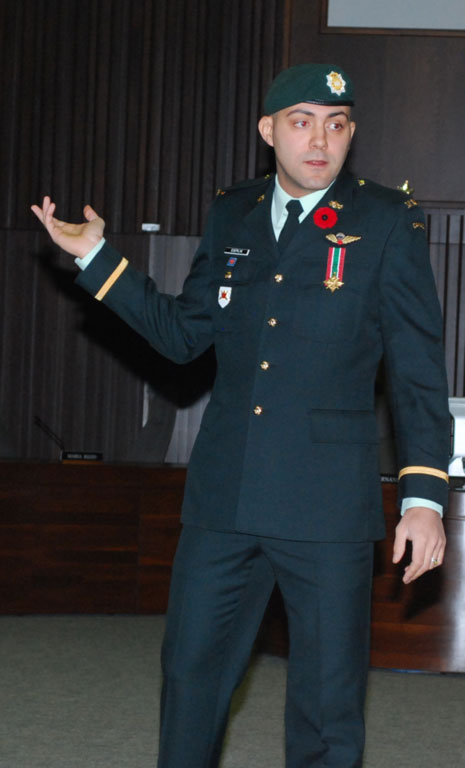
Second Lieutenant Christian Cieplik tells students on from St. Edward Catholic School about his 2010 tour in Kandahar, Afghanistan on Nov. 8.
- Photo courtesy of the Toronto Catholic District School Board.
Cieplik was one of three veterans invited to speak to students at the Catholic Education Centre during the week. Two years ago, while a member of the 3rd Battalion Royal Canadian Regiment, he received about 800 letters from students of his alma mater, Our Lady of Victory Catholic School, while deployed in Kandahar, Afghanistan.
"That was a huge gesture on their behalf and it was really cool because, depending on the age group, they tell you everything about themselves," said Cieplik.
Participating in Remembrance Day services is more than a tribute to those who've risked their lives for our freedoms, said Bruce Rodrigues, the board's director of education. It's also an expression of Canada's commitment to transforming the world.
"Because Remembrance Day falls on a non-school day this year, we wanted to ensure that we took the time within our school communities to reinforce its importance," said Rodrigues. "That importance would be to honour all of those who have sacrificed for peace and those who continue to serve our country."
Cieplik credits his time in Catholic school for preparing him for his stint in Afghanistan. He said it instilled him with a sense of service, respect and sacrifice.
"Being able to connect with people of different backgrounds and beliefs, that helped a lot over there," he said. "Especially dealing with locals and our interpreters. The Afghan National Army, they're all Muslim or Shiite, but I was still able to respect that faith and it was reciprocated. That helped a lot."
Cieplik, who joined the Canadian Forces in 2006 after graduating from York University where he studied political science, wants to give back to the school board. He began last school year with a speaking engagement at Our Lady of Victory, where students gave him a hero's welcome.
"Last year when I went to my old elementary school they were cheering, the kids were cheering, they went nuts," he said.
"The area I grew up in has grown more violent over the years in Toronto and you're just kind of showing that there is another option, that violence doesn't have to rule or dictate how you turn out or it shouldn't really affect your morals and ethics in a negative way."
Cieplik connected so well with the children that the board asked him to speak this year at the Catholic Education Centre during Veterans' Week. Before his address to more than 50 students from St. Edward Catholic School, the 31 year-old soldier said he'd stress that all war did not end in 1945, rather, a type of war ended.
"Everything has been engrained in their minds that it's poppies and white crosses, like older forms of wars in Europe," he said.
Rodrigues reiterated this.
"It's not about the past. It's about the present and about ensuring the future," he said.
Remembrance Day is as much about a moment of silence as it about learning from the voices of the past, Rodrigues said.
"Having someone who's had the experience puts a real face on the event," he said. "The veteran will often do that with students so they can understand here is a real human face that has lived this experience and is not telling it from a story perspective but rather a real life experience."
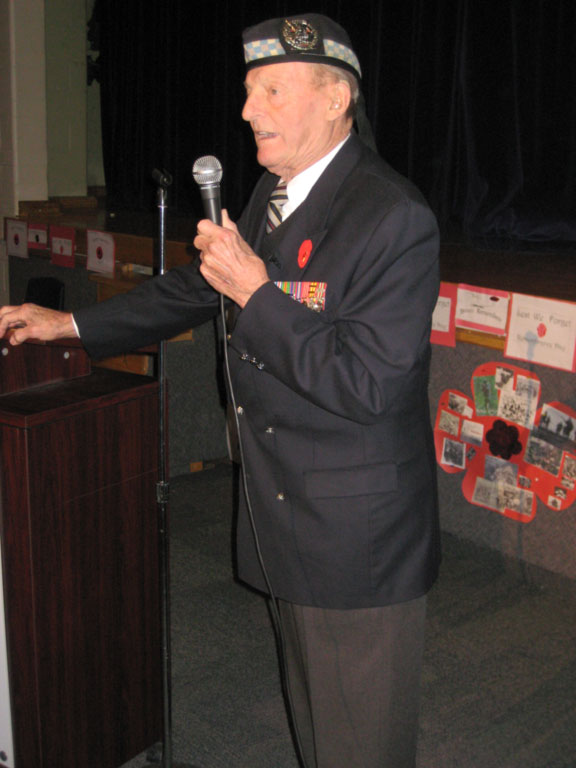
Word War II veteran Stan Egerton, who reached the rank company sergeant major, speaks to an auditorium full of students at Don Bosco Catholic Secondary School on Nov. 7.
- Photo courtesy of Tim Stewart
Veterans visited several schools during Veterans' Week. Second World War veteran Stan Egerton was at Don Bosco Catholic Secondary School and told students how, like many surviving WWII veterans, he lied about his age to join the service.
Egerton served under his brother George, a sergeant, for about two years in Europe before an artillery shell claimed his brother's life on Sept. 4, 1944. About a month earlier Egerton's other brother Frank, a private, was also killed in action, leaving him the family's sole surviving, son.
Often Remembrance Day services focus on the dead, the fighting and the destruction. But the TCDSB wanted a diverse range of veterans to teach students that there is more than one way to solve a conflict and fighting is always the last resort.
"Youth need to understand that there are other ways to solve conflict," Rodrigues said. "Today we wouldn't necessarily resolve conflict through fighting but through collaboration and that sense of coming together to find a common solution that can be attained through conversation."
Out of the Holodomor rises a stronger Church
By Michael Swan, The Catholic RegisterFew Ukrainians are thankful for Josef Stalin. In 1932-33 the Soviet dictator starved about six million Ukrainians to death in a planned genocidal famine known as the Holodomor.
But the new bishop for Ukrainian Catholics in France, Switzerland, Luxembourg, Belgium and the Netherlands has one good thing to say about Uncle Joe.
“Stalin aided the future missions by deporting people to Siberia, to Kazakhstan, to different corners of the vast expanse of the Soviet Union. There now, through descendants of the political prisoners and deportees, the Greek Catholic Church is slowly developing its mission — which of course is open to all people of good will who might be attracted to the Church,”
Bishop Borys Gudziak said as he passed through Toronto on a tour of Ukrainian communities in North America.
It’s a bit like thanking Satan for making Christ’s incarnation and resurrection necessary.
The Byzantine Rite Catholic Church in Ukraine survived three generations of often horrific martyrdom. For this Church to survive at all is one of the great accomplishments of the 20th century, said the Harvard-educated historian.
“Ukrainians are a post-traumatic people. They’ve had a toxic degree of trauma in the 20th century,” he said. “Seventeen million Ukrainians were killed in the 20th century.”
For three generations Ukraine was under occupation, kept in line by the highest concentration of KGB agents, informants and collaborators in the Soviet Union.
“People lived in fear,” said Gudziak. “Fear is never something that really opens people up. You sort of close in on yourself.”
But a closed-in, self-absorbed, defensive Church is not what the Syracuse, N.Y.-born son of immigrants has found in Ukraine. Within Ukraine, the Greek Catholics have become a beacon on a hill proclaiming openness and democracy, decrying corruption and authoritarianism. Particularly under Cardinal Lubomyr Husar, they have demanded a different future for their country.
“The Greek Catholic Church today is a Church of the martyrs. At the same time it’s a Church that’s favoured by intellectuals, young people, urbane businessmen and women who want Ukrainian society to change — rule of law to become the style of the country,” he said. “Since the Greek Catholic Church did not compromise with the regime, it emerged from the catacombs with incredible, relatively speaking, moral authority.”
As rector of the Ukrainian Catholic University in Lviv for the past 12 years, Gudziak has built this tiny university into a democratic island of free and open debate. Officers of the SBU, Ukraine’s security service, came visiting in 2010. They asked Gudziak to keep his students away from protesting a newly authoritarian government with ties to Moscow. Gudziak not only refused, he told everybody about the visit.
“The Church is actually quite free in Ukraine, limited only by its imagination. The Ukrainian Catholic University is itself witness to this,” said Ukrainian-Canadian Jesuit Father David Nazar in an e-mail to The Catholic Register.
Nazar describes Gudziak as a “high-end dreamer.” For Gudziak, being Christian means sharing those dreams. To follow a God who in Christ seeks the human means offering a fully human experience of God to the world without preconditions.
“Jesus really brings to us a call to a radical openness. It’s a going to the other,” he said. “My hope is that the radical deprivations Christians endured and in many ways still face in the former Soviet Union will be a place where the faith is forged.”
That martyrdom and oppression should be the forge for openness, charity, joy and hope is unexpected, and perhaps too much to ask. But over the past 25 years Gudziak’s Church has been witness to miracles.
“The intoxicating and exhilarating but often overwhelming change in society for the Church is now only in some ways settling, if you can say that any culture has settled in the first decades of the 21st century,” Gudziak said.
Gudziak will be enthroned as Apostolic Exarch at Notre Dame Cathedral in Paris Dec. 2.
Sault’s new school aims to preserve French culture
By Evan Boudreau, The Catholic RegisterFor the French Catholic community in Sault Ste. Marie, Ont., the newly constructed École Notre-Dame-du-Sault will provide students with the sense of belonging necessary for preserving their French identity.
“The community really wanted us to unite all of our students at one site and offer students a high quality school where they get to start off in Kindergarden and finish off in Grade 12,” said Paul de la Riva, spokesperson for the Conseil scolaire catholique du Nouvel-Ontario (CSCNO). “The board’s main goal is to keep our students from Kindergarden to Grade 12.”
But that isn’t what had been happening in northern Ontario’s third largest city. While there are two elementary schools — École Cardinal-Léger and École Notre-Dame-des-Écoles which was expanded to become the new school — it had been renting space at a local Catholic secondary school to house its own high school.
De la Riva said this lack of independent identity caused many students to move to the English boards, either public or Catholic, when they entered Grade 9.
“All our schools weren’t really up to par, they were old schools and they really weren’t meeting the needs of the community,” he said. “When you’re renting a spot or area in another school you may have your own wing but you’re always looking at what the others are doing, the bigger section of the school. By having our students in their own building it will build a sense of belonging.”
That’s what prompted the five-year, $12.5- million project of renovating, expanding and rebranding École Notre-Dame-des-Écoles for which the province put forward $11.26 million, with the additional funds coming from the board’s budget.
It isn’t just CSCNO students who will benefit from this new building, which held its official opening ceremony on Oct. 26. Along with housing the more than 300 students from Junior Kindergarden to Grade 12, the building will also host the French-language adult learning centre and the Centre francophone de Sault-Ste-Marie, as well as play a supportive role for many off site organizations.
It is hoped this will help establish the new school as a hub for francophone pride.
“The school’s community component is something we hold dear and which will certainly contribute to its growth and to the vitality of the francophone community in Sault Ste. Marie and the Algoma District,” said Lyse-Anne Papineau, CSCNO director of education, in a news release. “We strongly believe that the new school will become a key City of Sault Ste. Marie partner for many years to come.”
Not only does the board hope that more students will remain pupils of its system, the board also hopes to attract new students to the francophone system with the modern school which has a capacity of 565 students. To help ensure success in maxing out this expanded capacity, the school houses a French-language day care program for up to 30 children.
“It’s really important to support the parents in preserving their language,” said de la Riva. “If children are not going to French schools, we know that one generation from now you’re losing many francophones who may have knowledge of the language but will not have the skills or capacity to really speak the language, transmit the language and culture to their kids.”
Toronto’s interfaith director to be honoured by Christian Jewish Dialogue
By Michael Swan, The Catholic RegisterTORONTO - For Christian Jewish Dialogue of Toronto, talk is precious and deserves to be honoured. With those values front and centre, the 50-year-old organization will honour two people who have fostered conversations about faith, trust and our future together.
Franciscan Friar of the Atonement Father Damian MacPherson and Holocaust Education Centre operations manager Mary Siklos will be feted by Christian Jewish Dialogue at a Nov. 26 dinner in Toronto. Cardinal Thomas Collins will be the keynote speaker for the dinner at the Adath Israel Congregation.
For MacPherson dialogue with Jews is precisely how we are called to be Catholic.
“It (dialogue) is not a choice we can arbitrarily make. It has become a responsibility we must assume,” he said. “The Church can only fully be the Church if it’s faithful to its Jewish roots. Knowing the texts is not sufficient. Knowing the people who believe and have preserved the texts, knowing the covenant, is what we’re called to.”
It’s just the second time Christian Jewish Dialogue has honoured an individual with a dinner. Two years ago Rabbi Erwin Schild was recognized for more than half a century of work on building understanding between Toronto’s Christians and Jews. The organization now hopes to make the dinners in honour of champions of dialogue an annual event.
“A lot of people start to question the need for dialogue at all,” said CJDT director Barbara Boraks. “We’ve got diversity in education, but we’re forgetting that everything comes down to personal relationships and knowing our neighbours.”
The behind-the-scenes people who make dialogue possible aren’t often honoured, but should be, she said.
“The event honours those relentless, grassroots workers who never get properly acknowledged or recognized,” said Boraks. “Damian fits that with bells on.”
“He has devoted his professional life to building bridges and working together and building understanding for each other,” said Siklos of MacPherson.
For more than a decade, MacPherson has been director of ecumenical and interfaith affairs for the archdiocese of Toronto. He was also the founding president of the Toronto and Area Interfaith Council. MacPherson’s job is a perfect fit for a Franciscan Friar of the Atonement — a religious order founded more than a century ago in the hope of ecumenical dialogue and Church unity.
“It’s terribly important that the public knows that these initiatives are happening — that the churches are working with synagogues and synagogues are working with churches and there are Jewish organizations reaching out to Christian organizations,” said Siklos.
Siklos runs the largest Holocaust education event in the world from her base at the Sarah and Chaim Neuberger Holocaust Education Centre of the United Jewish Appeal Federation. Toronto’s annual Holocaust Education Week has been imitated in cities across North America.
The 32nd annual Holocaust Education Week program ran to 44 pages of events — speakers, art exhibits, films and plays — from Nov. 1 to 8.
“She manages it in such a way that it stays human,” said Boraks. “She never lost touch with the grassroots people — the survivors — and they all love her.”
Tickets for the CJDT dinner are $40 and available by calling (416) 598-4242 or e-mailing info@cjdt. org.
University of St. Michael's College teaching assistants poised to strike
By Michael Swan, The Catholic RegisterTORONTO - University of St. Michael's College graduate theology courses, undergraduate classes, continuing education programs and help for students in writing labs will cease Nov. 15 unless the Catholic college at the University of Toronto can make a deal with the union representing academics who work under contract.
The Ontario Labour Board has issued a no board report and representatives of CUPE local 3902, Unit 4, claim negotiations have reached an impasse.
In a statement on its web site, St. Michael's College claims there is no impasse. Representatives of the college refused to speak with The Catholic Register about the situation.
Job security is the sticking point, said CUPE bargaining committee chair Daniel Bader. Teaching assistants and sessional lecturers work on contract of less than 12 months with no guarantee of future work, even though many have been teaching the same courses for years and the college has no plans to give those courses to higher cost full-time faculty.
"Really it's a matter of justice that when you have work that is continuous that you have employment that maps onto that," Bader said.
Academics like Bader, who teaches philosophy to graduate theology students, have trouble getting mortgages or even leases because they can't prove they will be employed beyond their contracts, he said.
The union is asking for right of first refusal if the course they are teaching is offered again.
St. Michael's College would not answer questions about how many students would be affected by a strike or lockout.
The college claims it has offered wage parity with University of Toronto for theology course instructors.
"There's a general situation in universities as a whole where an increasing amount of the work that's being done at universities is on short-term contract, even though the work is not short term," Bader said. "So you have employment that doesn't map onto the work. We're not saying that the courses need to continue. What we're saying is that if the courses continue we should continue in that work."
Multifaith council loses funding
By Michael Swan, The Catholic RegisterThe 40-year-old co-ordinating body for chaplaincy in Ontario will lose all of its provincial funding, nearly half-a-million dollars, as of March 31.
The Ontario Multifaith Council is working on a “transition plan” that may see it continue as a smaller organization focussed on lobbying for chaplaincy funding at Ontario hospitals, nursing homes and prisons.
The Ontario bishops, who only rejoined the organization this spring, would like to see the council continue past the provincial funding sunset, said Assembly of Catholic Bishops of Ontario general secretary Lou Poivesan.
“(The bishops) felt it was important to have a common voice on advocating for chaplaincy services, because across the province in hospitals and other institutions chaplaincy services certainly have, other than in Catholic institutions, they don’t seem to have a high priority,” Poivesan said.
There are 32 religious groups represented in the Ontario Multifaith Council, including Ontario’s Catholic bishops.
Since the province shut down all its large residential care facilities for people with disabilities in 2009, there hasn’t been as much demand for Ontario Multifaith Council services, said Ministry of Community and Social Services spokeswoman Charlotte Wilkinson.
“This resulted in the steady decline in need for services provided by the OMC as the organization had primarily been responsible for supporting chaplains in government facilities on religious matters,” Wilkinson wrote in an e-mail to The Register.
Ministry of Community and Social Services funding to the council for the year ending March 31 was $493,200.
The provincial government notified the council of the funding cut a year in advance to give the organization time to wind down or find other sources of funding, Wilkinson said, adding there’s no chance the ministry will reconsider funding the organization.
Over the years the Ontario Multifaith Council has published, in books and on its web site, information about spiritual practices and beliefs of various religions. It also runs seminars for chaplains and volunteers and maintains regional multifaith committees. The Toronto-based organization maintains a library for chaplains seeking information about minority religions and cultural practices. The government saw this as needless duplication of information that was already available in libraries, on the Internet and directly from religious organizations.
In 2004-2005 the Ontario bishops withdrew from the council over its activities promoting cultural tolerance rather than ensuring qualified chaplains are available and supported in all institutions. In April 2005 the bishops suspended indefinitely its membership in the organization. In 2010 it revived an “observer status,” looking for assurance the organization would be more focussed on chaplaincy.
With budgets tightening, particularly at hospitals, the bishops believe the future role for the council will be as a united voice advocating for professional chaplaincy, said Poivesan.
“I don’t think everything should be devolving to volunteers to provide those services,” he said.
No one from the Ontario Multifaith Council was available to speak with The Register.
Antigonish clears its abuse debt
By Catholic Register StaffANTIGONISH, N.S. - The diocese of Antigonish in Nova Scotia no longer owes $16 million to 125 victims of clerical sexual abuse.
The diocese has made its final payment to settle a class-action lawsuit, the Canadian Press reports. The settlement was negotiated by former Bishop Raymond Lahey, who was arrested on charges of importing child pornography just three weeks after announcing the deal to settle claims dating as far back as the 1950s.
The lawsuit was initiated in 2002 by Ron Martin, whose brother committed suicide that year leaving a note about abuse he suffered at the hands of Fr. Hugh Vincent MacDonald. MacDonald was charged in 2003 but died before his trial could come to a conclusion.
The last payment is not the end of the process of healing, said diocesan spokesman Fr. Don MacGillivray.
“Healing always takes time,” MacGillivray told the Canadian Press. “But I’m a person of hope, and that’s what my faith calls me to be.”
The diocese put 150 properties up for sale, dumped its shares in the local weekly paper, The Casket, and drained savings from parishes to come up with the full settlement.
Cape Breton University honours pioneering nun
By Catholic Register StaffSYDNEY, N.S. - Cape Breton University recognized the contributions of Sr. Margaret Harquail to the school’s business program by naming a garden space in her honour.
Harquail Gardens is the new name of the space between the Verschuren Centre and the Shannon School of Business.
“Just as it is important for our university to progress, it is equally important for us to recognize those who have been instrumental to our success,” said Dr. John Harker, Cape Breton University’s president. “Sr. Harquail had a vision for our fine business school, and through hard work and commitment she helped shape the school into what it is today. The Harquail Gardens will be a lovely reminder of Sr. Harquail’s spirit and her contribution to the business community.”
Harquail established the School of Business Administration at the University College of Cape Breton, as well as the Canadian Institute of Management (CIM) certificate program. Harquail was also instrumental in establishing the College of Cape Breton as a university.
On hand for the ceremony was Minister of Finance Jim Flaherty, Harquail’s nephew.



